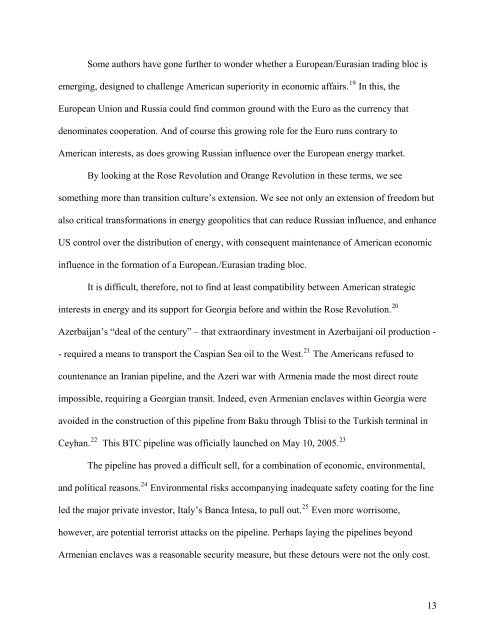from transition to hegemony - The Watson Institute for International ...
from transition to hegemony - The Watson Institute for International ...
from transition to hegemony - The Watson Institute for International ...
You also want an ePaper? Increase the reach of your titles
YUMPU automatically turns print PDFs into web optimized ePapers that Google loves.
Some authors have gone further <strong>to</strong> wonder whether a European/Eurasian trading bloc is<br />
emerging, designed <strong>to</strong> challenge American superiority in economic affairs. 19 In this, the<br />
European Union and Russia could find common ground with the Euro as the currency that<br />
denominates cooperation. And of course this growing role <strong>for</strong> the Euro runs contrary <strong>to</strong><br />
American interests, as does growing Russian influence over the European energy market.<br />
By looking at the Rose Revolution and Orange Revolution in these terms, we see<br />
something more than <strong>transition</strong> culture’s extension. We see not only an extension of freedom but<br />
also critical trans<strong>for</strong>mations in energy geopolitics that can reduce Russian influence, and enhance<br />
US control over the distribution of energy, with consequent maintenance of American economic<br />
influence in the <strong>for</strong>mation of a European./Eurasian trading bloc.<br />
It is difficult, there<strong>for</strong>e, not <strong>to</strong> find at least compatibility between American strategic<br />
interests in energy and its support <strong>for</strong> Georgia be<strong>for</strong>e and within the Rose Revolution. 20<br />
Azerbaijan’s “deal of the century” – that extraordinary investment in Azerbaijani oil production -<br />
- required a means <strong>to</strong> transport the Caspian Sea oil <strong>to</strong> the West. 21 <strong>The</strong> Americans refused <strong>to</strong><br />
countenance an Iranian pipeline, and the Azeri war with Armenia made the most direct route<br />
impossible, requiring a Georgian transit. Indeed, even Armenian enclaves within Georgia were<br />
avoided in the construction of this pipeline <strong>from</strong> Baku through Tblisi <strong>to</strong> the Turkish terminal in<br />
Ceyhan. 22 This BTC pipeline was officially launched on May 10, 2005. 23<br />
<strong>The</strong> pipeline has proved a difficult sell, <strong>for</strong> a combination of economic, environmental,<br />
and political reasons. 24 Environmental risks accompanying inadequate safety coating <strong>for</strong> the line<br />
led the major private inves<strong>to</strong>r, Italy’s Banca Intesa, <strong>to</strong> pull out. 25 Even more worrisome,<br />
however, are potential terrorist attacks on the pipeline. Perhaps laying the pipelines beyond<br />
Armenian enclaves was a reasonable security measure, but these de<strong>to</strong>urs were not the only cost.<br />
13
















